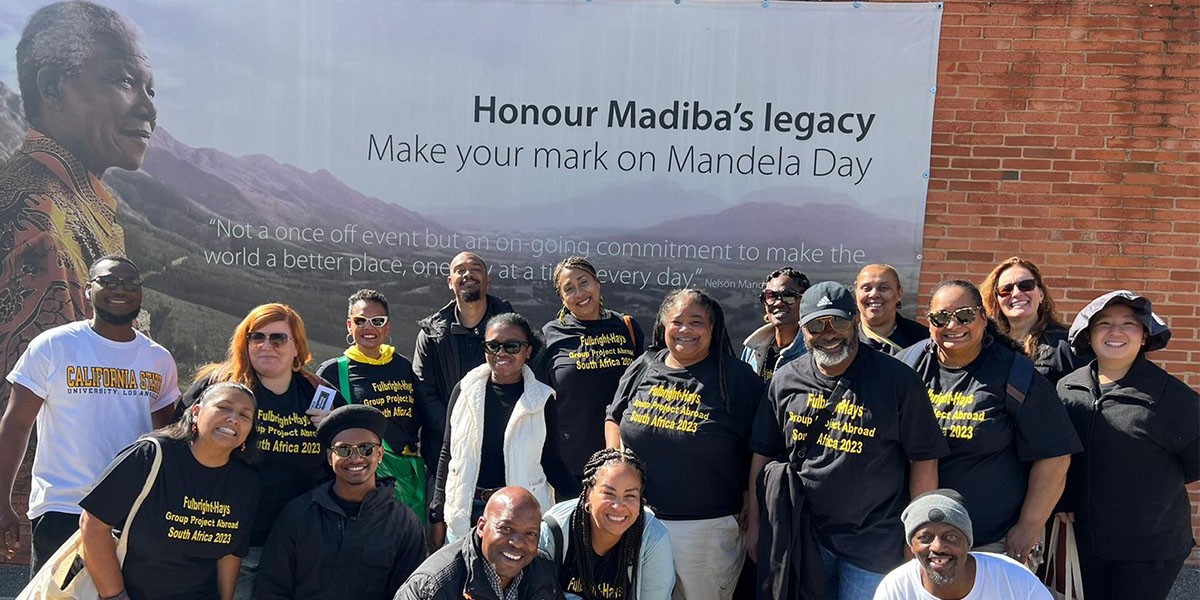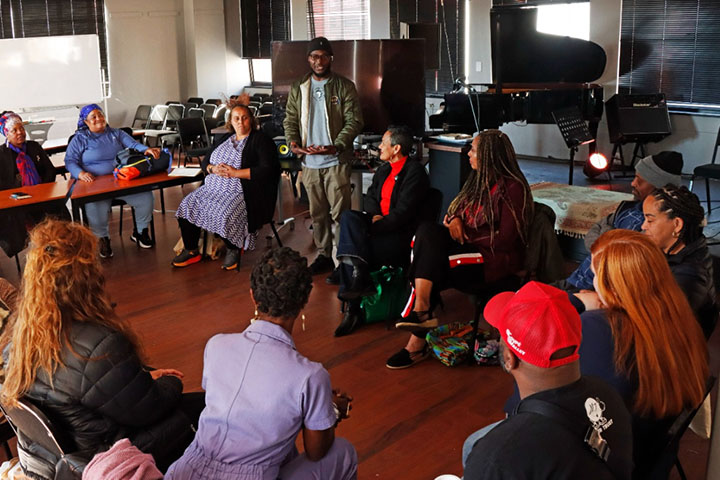African Indigenous Knowledge Systems:
Health, Healing, and
Well-Being in South Africa
Fulbright-Hays Short-Term Curriculum Development
Group Project Abroad (GPA) in South Africa
We are thrilled to announce that the Department of Pan African Studies at the College of Ethnic Studies has been awarded the Fulbright-Hays Group Projects Abroad grant for educators by the U.S. Department of Education for the second time! This grant will enable the department to lead a transformative educational journey for U.S. educators, administrators, and graduate students to South Africa in the summer of 2025.

The 2025 program aims to advance the missions of Pan African Studies and Ethnic Studies by immersing secondary and post-secondary educators, administrators, and graduate students from across the United States in South African culture for four weeks in July 2025, so they can develop an emancipatory curriculum. Participants will have the invaluable opportunity to learn the Zulu language and culture, as well as gather knowledge and materials related to indigenous African health-related knowledge systems. This experience will enrich U.S. secondary and post-secondary curricula with topics and materials focused on indigenous African health and healing practices.
You can reach out to the program director or coordinator, using the contact information below, for any inquiries.
Announcement
The program’s target group includes U.S. K-12 educators; faculty members at higher education institutions in the U.S.; and administrators at state departments of education, higher education institutions, or school districts in the U.S. who are responsible for planning, conducting, or supervising programs in school systems at all levels. It also includes graduate students or juniors/seniors in higher education institutions in the U.S. who are prospective teachers in modern foreign languages and area studies.
The program encourages individuals who meet the criteria above and work in the fields of ethnic studies, Pan African Studies/Africana Studies, African history, or other Africa-related study areas to apply. Additionally, individuals working within the California State University System, minority-serving institutions of higher education, the Los Angeles Unified School District, or other minority-serving school districts throughout the United States are encouraged to apply.
Pre-Departure Orientation (virtual): June 16 – June 20
Overseas Project Dates: June 29 – July 30
Depart U.S.: Saturday, June 28
Arrival in South Africa: Sunday, June 29
Depart South Africa: July 30
*note: program dates are tentative, actual dates may change by a day or couple of days depending on availability of flights.
Participant Eligibility: All participants must be U.S. citizens, nationals, or permanent residents and studying full-time or employed. They should be teaching, studying, or administering in the fields of humanities, social sciences, foreign languages, and/or area studies. The group may include:
- K-12 Educators;
- Faculty members at higher education institutions;
- Administrators at state departments of education, higher education institutions or school districts who are responsible for planning, conducting, or supervising programs at school systems at all levels; and
- Graduate students, or juniors/seniors in higher education institutions, who are prospective teachers in modern foreign languages or area studies.
The Fulbright-Hays SHORT-TERM CURRICULUM DEVELOPMENT GPA grant covers the following expenses:
- International travel to and from Durban, South Africa from New York City, or any other designated U.S. departure airport.
- Accommodation and food for the duration for the program.
- Program-related transportation in South Africa.
- Entrance fees to museums and performance shows.
- Educational materials distributed during the program.
The grant does not cover:
- Participant Program Fee of $665 to cover administrative expenses in the United States
- Local travel from the participants’ homes to New York City, John F. Kennedy Airport or any other designated U.S. departure airport and return after the program. (Participants are advised to seek funding support from their institutions, academic departments, etc. for Program Fee and local travel).
- Mandatory health insurance for the summer abroad in South Africa.
- Passport and visa fees.
- Inoculations and other health-care expenses related to travel.
- Travel done on the student’s own time and initiative in Southern Africa.
- Personal shopping and gifts.
How to Apply
Before applying, please prepare to upload two letters of recommendation and your curriculum vitae/resume. Be prepared to answer questions about your demographic information. Also, prepare answers for three essay questions:
1. Why did you choose this program? (please use a minimum of 250 words).
2. How do you think learning the Zulu language and culture, and about health, healing, and well-being in South Africa might enhance your curriculum (feel free to mention other ways you plan to use the knowledge, skills, and experiences you gain from this program at your institution)? (please use a minimum of 125 words).
3. What aspects of your personal experience (for instance, personal background, relevant course work, job experiences, previous travels, etc.) have prepared you to live and study in South Africa? (please use a minimum of 125 words).
Deadline: Friday, November 15, 2024 at 11:59 p.m. PST
Candidate Selection: Candidates will be selected by a committee made up of specialists in Zulu and other African languages and Africa-related study areas. Selections will be based on the requirements stated in the program announcement. You will be notified by Friday, December 16, 2024, about the outcome of your application. If you are successful, you will be sent additional information concerning the program at that time.
Curriculum
The program is comprised of six components, namely:
The Zulu GPA coursework is comprised of two sections: Language and Culture Education. The communicative/conversational language acquisition & use (Part I) of the Zulu course is tied to rest of the GPA curriculum components, namely guest seminars, educational tours of cultural/historical sites, workshops, resource materials, and modules development. The course is designed around the 5Cs of the U. S. National Standards for Foreign Language Learning, namely, Communication, Cultures, Connections, Comparisons, and Communities to enable participants in their process of becoming lifelong learners to develop insight into the nature of the language and the culture of the Zulu people as well as the ability to use the Zulu language in appropriate contexts. The contents of this section are mainly drawn from authentic materials including stories, newspaper articles, poems, ads, and songs. Texts from various textbooks designed for second language learners are also used. At the completion of this course participants can discuss a variety of contemporary issues (cultural and religious practices, family life/relationships, political events, education, Zulu history etc.). Culture Education (Part II) of the Zulu course is tied to the language education section (Part I) as well as the rest of the GPA curriculum components, namely tours to cultural and historical sites, workshops or discussions, lecture seminars, resource materials and module development.
Lecture seminars are held weekly, by expert faculty from partnering institutions in South Africa as well as community experts on a wide range of topics, including Zulu history, aspects of the Zulu culture, gender in the Zulu culture and impact on health, language and health in South Africa, indigenous healing of the Zulu people, role of health attitudes and beliefs in South African societies, impact of apartheid and democracy on health and healing, pre and post- apartheid migration and its impact on health, culture, and language in South Africa, and the history of music, role of music during apartheid, its impact on the psyche and behavior, etc.
Participants will visit historical and cultural sites in Gauteng, KwaZulu-Natal, and Western Cape Provinces. Examples of sites include Apartheid Museum, Freedom Park Museum, Phansi Museum (Zulu clothing museum), EShowe Museums (Christianity/Zulu wars/Zulu Baskets & Beads), Soweto Township/Nelson Mandela House Museum, Migrant Labor Museum, the Kirby Collection at the College of Music at the University of Cape Town, Robin Island, etc.
The hands-on workshop and discussion attendance are designed to teach participants how health and healing are understood and practiced in South Africa.
Participants will visit bookstores, markets, and indigenous music instrument stores in all three provinces to acquire resource materials to be incorporated in the development of their U.S. curriculums.
Participants will utilize the final week of the project to work on their modules, these modules will be incorporated into their curriculums. Once the modules have been finalized, reviewed, and approved by the participants they will be made available electronically to the entire community of educators and administrators in the United States, and participants will disseminate the modules at relevant conferences and workshops in the United States.
The program is funded by U.S. Dept. of Education to provide intensive instruction in the Zulu language and culture. During the project participants will have time to make contacts with South African academics and administrators to discuss research affiliation and similar matters related to their future academic/research plans. But participants will not have time to pursue personal projects related to their own educational program.
Program Contacts
Professor Dlamini
Coordinator, Fulbright-Hays Short-Term GPA
Pan African Studies Department
323-343-2290
Dr. Serie McDougal
Director, Fulbright-Hays Short-Term GPA
Pan African Studies Department
323-343-2290
